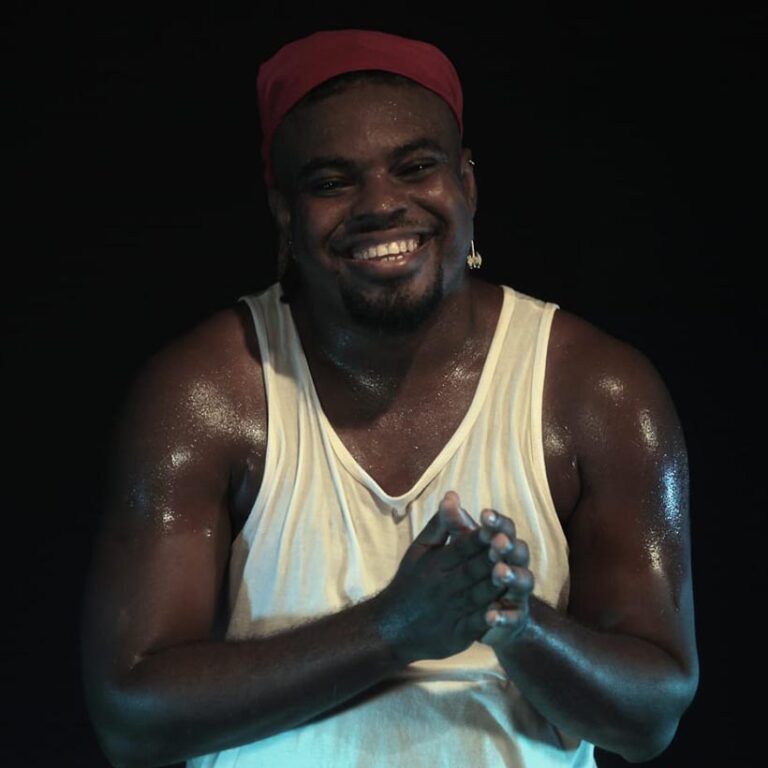Brunno de Jesus
DANCER, CHOREOGRAPHER, SINGER-SONGWRITER
Salvador (Bahia)
Updated on October 22, 2024
Brunno de Jesus is a dancer, choreographer, singer-songwriter, and researcher of black and peripheral cultures. He has a degree in Dance (UFBA, 2014), a specialization in Contemporary Dance Studies (UFBA, 2016), and a Master’s degree in Dance (2020). He is currently a PhD Candidate in Dance at the Federal University of Bahia, where he has worked as a substitute teacher (UFBA, 2020 /2021). Brunno de Jesus is also the creator and director of the National Black Arts Platform and an educator at the Axé project – Center for the Defense and Protection of Children and Adolescents.

Foto: Sergio Isensee
BAILARINO, COREÓGRAFO, CanTOR E COMPOSITOR
Brunno de Jesus
Salvador (Bahia)
updated on october 22,2024

Foto Sergio Isensee
Brunno de Jesus is a dancer, choreographer, singer-songwriter, and researcher of black and peripheral cultures. He has a degree in Dance (UFBA, 2014), a specialization in Contemporary Dance Studies (UFBA, 2016), and a Master’s degree in Dance (2020). He is currently a PhD Candidate in Dance at the Federal University of Bahia, where he has worked as a substitute teacher (UFBA, 2020 /2021). Brunno de Jesus is also the creator and director of the National Black Arts Platform and an educator at the Axé project – Center for the Defense and Protection of Children and Adolescents.
Body of work
Brunno de Jesus is a young multilingual artist, a black man born in the city of Salvador, Bahia, the son of Marita de Jesus and Henrique Bispo da Silva. As a choreographer and director, he has more than 12 shows to his credit. He was awarded the Leda Maria Martins National Prize in the Ancestrality category for his show DI-QUEBRADA (2021). He directed the documentary RAIMUNDOS: Mestre King e as figuras masculinas da dança na Bahia (2016), which tells the story of the first black man to graduate in dance in Latin America. He is part of the New Artists in Contemporary Art series produced by IAE – Instituto Arte na Escola (2022) on Canal Futura. He released his first album, EPA REI, with 7 unreleased tracks in March 2022, and the EP Tranca Rua in 2023. He premiered his solo Sample: é que nem cortar quiabo (Sample: it is just like chopping okra) at the Kuruchue International Festival of Performing Arts in Chile, and was part of the program of the 14th International Dance Biennial of Ceará. Restless and inventive, he thinks of dance and the body on stage as a medium to research scenic technologies to create futures and dynamics as a mode of existence.
Sample: It’s Like Cutting Okra
Sample: it’s like chopping okra is a way of the body, a mode of understanding memory as layers within time. Chopping okra to nourish and strengthen the desire that moves dances, sounds, and vibrates in the skin. It is food from the orixás sango and oyá, warming the dance of now. It is a performance to acknowledge the memory of dances that have left their traces and have become other dances. Which dances of our elders make up our layers of memories?
The 40-minute show gathers references to Bahian black dances in poetic narratives and names such as Nadir Nóbrega, Leda Ornelas, Marilza Oliveira, Mestre King, Augusto Omolu, and others. It is a journey into the memory of a contemporary black body.
The chanting that salutes the orixás, the aesthetics that summon up memory, the symbolism of the orixás, and the sounds instruct the audience in the sound clave of the daró (touch for the orixá Iansã), the maculelê as a war dance with interaction with the audience: these are the games that invite us to dance together and sample the memory of black dance in Bahia.
Epa Rei
Brunno de Jesus is a black artist from the city of Salvador who has been fascinated by music since he was a child. His artistic inclination was so great that he imagined himself on stage singing for millions of people. That was his childhood game. From an early age, he drummed on paint cans and glass bottles and also sang in his backyard. He always accompanied his father to the serenades in the neighborhood where he lived. And like everyone from Bahia, he never missed a carnival. He used to go with his father to the parades of Afro-blocos such as Ilê Aiyê, Olodum, and Os Negões, as well as following the band Timbalada and É o Tchan. As an adult, Brunno’s path led him to dance. He studied and became a Brazilian dancer, choreographer, singer and songwriter. Son of Sàngo at Ilê Axé Onirê Unxê Omi Oyá.
In 2014, the composition Identifique-se, a partnership with singer Jeferson Akenaton, came 2nd in the Vozes da Terra Music Festival. The following year, he released his first single: Jogo bola. A researcher of black and peripheral cultures, Bruno de Jesus did his master’s, specialization, and PhD in dance at the Federal University of Bahia. He was also a Substitute Professor of the dance graduate course at UFBA, imparting knowledge to hundreds of students. In 2021, he was awarded the Leda Maria Martins National Prize in the Ancestrality category for his show DI-QUEBRADA. He also conceived the EPA! Peripheral Arts Meeting, held between 2017 and 2021. He directed the documentary RAIMUNDOS: Mestre King e as figuras masculinas da dança na Bahia. The film tells the story of the first black man to graduate in dance in Latin America.
He recently performed the song Quando o Muzenza passar by Ney Baiano and Yure Cajazeiras at the 36th Bloco Afro-Muzenza Samba Reggae Music Festival. The show Epa Rei, which takes its name from his first album, opened the Arts Festival in Pernambuco and was also performed in the Choir Room of the Castro Alves Theater in Salvador.
Released at the beginning of 2022, Epa Rei features elements of candomblé and Yoruba culture. Like the album, the show builds an affective soundscape in an Afro-pop mix of poetry, candomblé music, sambas, samba reggae, R&B, and percussive ballads. With great percussion and dance solos, the artist brings sensory experiences to the audience with his music. It is an interactive and sensorial concert.
National Black Arts Platform
The BLACK ARTS NATIONAL PLATFORM is consolidating its third edition in 2025. The project was born out of scarcity, non-visibility, and non-belonging. It was created and carried out by young black people from the “quebradas” of Salvador who didn’t feel represented in the few existing circuits. After two successful editions, the platform has expanded its mission, reformulating its brand and programming activities into interdependent actions of national and international connections, which can unfold at any time of the year. It no longer functions as a festival program, but as an alternative platform that connects black men and women from Brazil and abroad through their artistic productions. The platform focuses on emerging artists, those who are not part of the few existing circuits or are only barely part of them. In other words, it is a platform that seeks to strengthen the link with the creative market, with the city of Salvador as its hub. Following this expansion, PLATAFORMA was invited by the Ceará International Dance Biennial to present artists from its latest edition. Following this, the platform invited a show to be programmed in March 2024, which brought together Africa and Latin America, as well as more than 7 Brazilian states, occupying important spaces in Salvador, such as the Choir Room of the Castro Alves Theater, the São Joaquim Fair, Pelourinho, candomblé yards, Espaço Xisto, stations, buses, among others. Its differential is being a generator of opportunities for connections and hope.
Body Tribute
Corpo Homenagem (Body Tribute) is a series of twelve 90-minute videos that brought dance to TV and social media. Six black male and female dancers were invited to the TVE studio to present a dance solo in homage to their masters. With artistic solos written, interpreted, and performed by all guest artists, the series presented different body languages, including Afro-Brazilian dance, samba, and modern and contemporary dance. The six black guest artists highlighted the paths and legacies of great names in Bahian art through body language. Each dancer selected a master who is a reference in life, art, and politics in their trajectory, but also an authority for the whole of Brazilian society as an example of struggle, vanguardism, and the construction of diasporic black knowledge. Dancer and choreographer Mestre King (in memorian) was honored by Brunno de Jesus.
The program produced a report with each artist, in which they explained their relationship with their masters and the creative process of each solo. The six video-dance works and their respective reports constitute the Corpo Homenagem (Body Tribute) series, shown on TVE Bahia.
Body Tribute (Credits):
Produced by TVE Bahia
Conception and direction: Carolina Canguçu and Candai Calmon
Set and lighting design: Edmundo Júnior
Coordination: Sérgio Couto Studio
TV Director: Denilson Santana
Editing: Carolina Canguçu and Marcos Fiais
Stills: Sergio Isensee
The updating of the information on this page and the veracity of the information contained in it are the responsibility of Brunno de Jesus. If you find any mistakes or inconsistencies, please contact us on the channels above or by sending a message to oyo.producao@gmail.com

